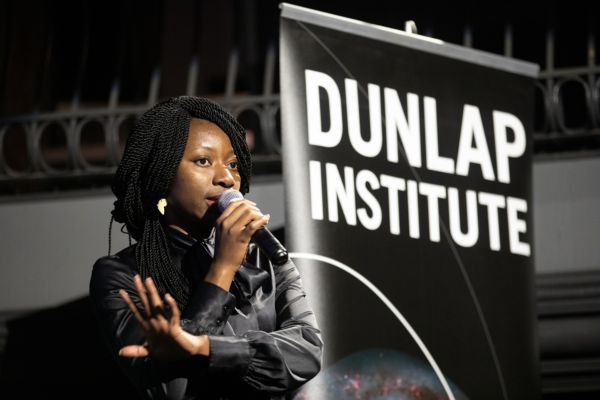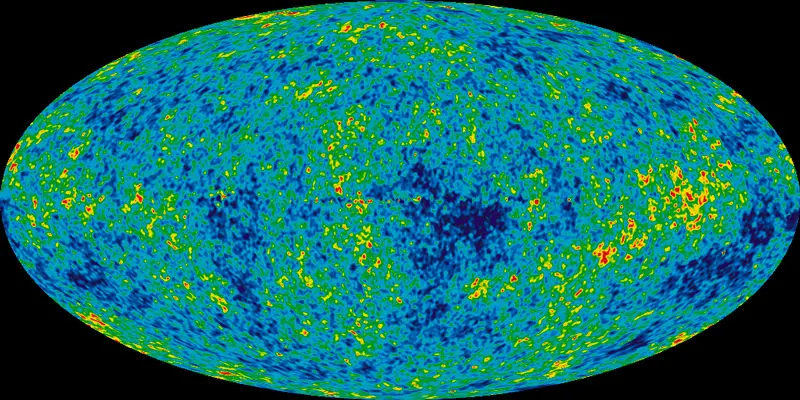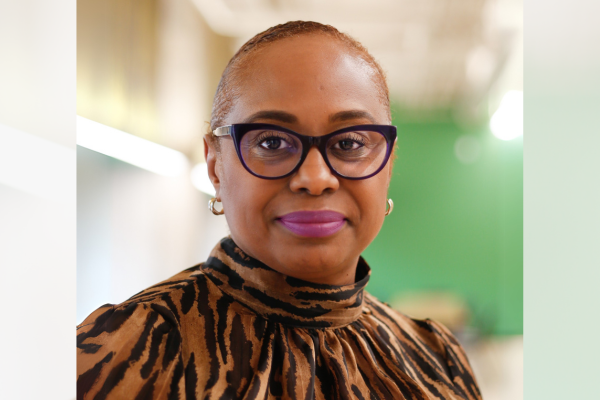‘A black box in astronomy knowledge’: PhD researcher probes the earliest stars in the universe


As a child, Margaret Ikape had a prime view of the stars from her hometown of Lagos, Nigeria.
“When I was really young, I saw a shooting star. And that got me looking up at the night sky a lot more,” Ikape says. She recalls thinking: “Can I count all the stars? Can I really go to a star? What would it be like if I could really go to a star? How long would it take?”
Today, Ikape is still looking at stars with the same curiosity, albeit ones that are much farther away. A PhD researcher at the University of Toronto’s Dunlap Institute for Astronomy & Astrophysics and David A. Dunlap Department of Astronomy & Astrophysics, she’s working to tell the story of the first stars in the universe, and how they influenced everything that followed.
Theory predicts that ultraviolet light from the first stars was so powerful that it ionized — or split — some of the first hydrogen atoms back into protons and electrons. This period of cosmic history is known as the Epoch of Reionization (EoR). During this time, the first stars and galaxies began to form, and with them, the universe as we know it today.
Ikape is working to determine the properties of these first stars, like how big they were and how long the reionization took. “That period is like a black box in astronomy knowledge. We know it happened, because the universe is ionized today, but we don’t know many details about it,” Ikape says.
Current optical telescopes cannot see back far enough to capture the EoR, so Ikape uses thousands of computer simulations to reimagine it and test theories in a kind of virtual sandbox shaped by what we know of the universe. Some of these simulations require significant processing power and must be run through the “Helen” computing cluster, named after renowned Canadian astronomer Helen Sawyer Hogg.
Ikape also learns about the EoR by studying the first light emitted in the universe, the Cosmic Microwave Background (CMB). As light from the CMB travels to Earth, it passes through all that is between us and the point in cosmic history at which the CMB was emitted, approximately 380,000 years after the Big Bang. Ikape can isolate how light from the CMB was impacted by the EoR and analyze it to tell us more about this time.
“Margaret’s work connects models and simulations of how the first stars in the universe lit up and ionized the surrounding gas with our observations of the cosmic microwave light—so she is the detective piecing the story together,” says Associate Professor Renée Hložek, Ikape’s PhD supervisor.
Ikape has forecasted that a new generation of telescopes will unlock more details about this mysterious period and the universe’s first stars, including the Simons Observatory and the fourth-generation ground-based cosmic microwave background experiment, or CMB-S4. She co-authored research that predicts that the CMB-S4 will help scientists close in on when the EoR began and how long it lasted.

When she isn’t unpacking the mysteries of distant stars, Ikape is involved in outreach initiatives on the ground.
She’s an instructor with the Pan-African School for Emerging Astronomers, a bi-annual school for emerging astronomers in Africa that aims to introduce astronomy undergraduate students to research practices and career avenues in the field, and participated in its inaugural program in Zambia in 2022.
In Toronto, Ikape was recently a speaker at Astronomy on Tap and has given presentations on astronomy at libraries, high schools and even a long-term care home.
“We are lucky to have students like Margaret at the Dunlap Institute; she combines her scientific curiosity with a passion for sharing what she learns with the broader community and training the next generation of bright minds,” Hložek says.
“The universe fascinates me a lot and I’m super excited every time I think about it,” Ikape says. “So I think that everybody should know about it.”







